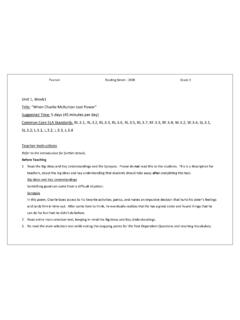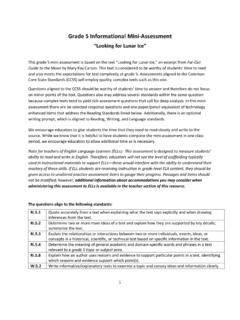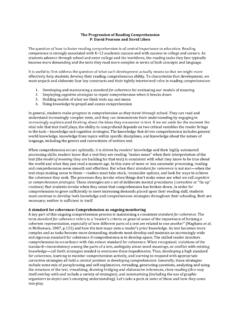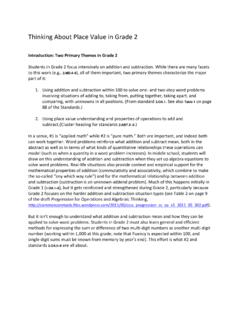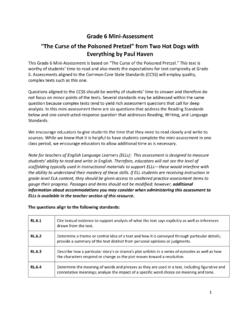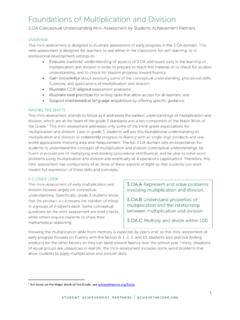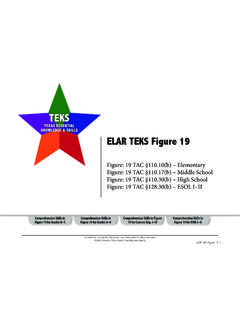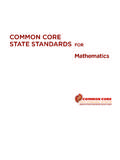Transcription of Grade 4 Literary Mini-Assessment - Achieve the Core
1 Grade 4 Literary Mini-Assessment Paired excerpts from Yang the Eldest and His Odd Jobs and Out of the Dust This Grade 4 Mini-Assessment is based on excerpts from two novels, Yang the Eldest and His Odd Jobs by Lensey Namioka and Out of the Dust by Karen Hesse. This set of texts is considered to be worthy of students' time to read and also meet the expectations for text complexity at Grade 4. Assessments aligned to the Common Core State Standards (CCSS) will employ quality, complex texts such as these. Questions aligned to the CCSS should be worthy of students' time to answer and therefore do not focus on minor points of the texts. Questions also may address several standards within the same question because complex texts tend to yield rich assessment questions that call for deep analysis. Not all questions included in the set refer to both texts, given that it is necessary for students to read and understand each text independently as they are synthesizing across texts.
2 In this Mini-Assessment there are five selected-response questions and three paper/pencil equivalents of technology enhanced items that address the Reading Standards listed below. Additionally, there is an optional writing prompt, which is aligned to both the Reading Standards for Literature and the Writing Standards. We encourage educators to give students the time that they need to read closely and write to the source. While we know that it is helpful to have students complete the Mini-Assessment in one class period, we encourage educators to allow additional time as necessary. Note for teachers of English Language Learners (ELLs): This assessment is designed to measure students'. ability to read and write in English. Therefore, educators will not see the level of scaffolding typically used in instructional materials to support ELLs these would interfere with the ability to understand their mastery of these skills.
3 If ELL students are receiving instruction in Grade -level ELA content, they should be given access to unaltered practice assessment items to gauge their progress. Passages and items should not be modified; however, additional information about accommodations you may consider when administering this assessment to ELLs is available in the teacher section of this resource. The questions align to the following standards: Refer to details and examples in a text when explaining what the text says explicitly and when drawing inferences from the text. Determine a theme of a story, drama, or poem from details in the text; summarize the text. Describe in depth a character, setting, or event in a story or drama, drawing on specific details in the text ( , a character's thoughts, words, or actions). Determine the meaning of words and phrases as they are used in a text, including those that allude to significant characters found in mythology ( , Herculean).
4 Explain major differences between poems, drama, and prose, and refer to the structural elements of poems ( , verse, rhythm, meter) and drama ( , casts of characters, settings, descriptions, dialogue, stage directions) when writing or speaking about a text. Compare and contrast the point of view from which different stories are narrated, including the difference between first- and third-person narrations. Compare and contrast the treatment of similar themes and topics ( , opposition of good and evil) and patterns of events ( , the quest) in stories, myths, and traditional literature from different cultures. 1. Write informative/explanatory texts to examine a topic and convey ideas and information clearly. Draw evidence from Literary or informational texts to support analysis, reflection, and research. Demonstrate command of the conventions of standard English grammar and usage when writing or speaking.
5 Demonstrate command of the conventions of standard English capitalization, punctuation, and spelling when writing. Use knowledge of language and its conventions when writing, speaking, reading, or listening. 2. Contents Grade 4 Mini-Assessment Yang the Eldest and His Odd Jobs and Out of the Dust (Print for students)..4. Information for Teachers: Quantitative and Qualitative Analyses of the Texts .. 17. Question Annotations: Correct Answers and Distractor 20. Using the mini -Assessments with English Language Learners .. 24. Additional Resources for assessment and CCSS Implementation .. 27. The assessment questions in this document align with the CCSS and reflect the instructional shifts implied by the standards. To learn more about these topics, please go to the following link: 3. Grade 4 Mini-Assessment Paired excerpts from Yang the Eldest and His Odd Jobs and Out of the Dust Today you will read two texts about people who love to play music.
6 You will then answer questions based on these texts. I will be happy to answer questions about the directions, but I will not help you with the answers to any questions. You will notice as you answer the questions that some of the questions have two parts. You should answer Part A of the question before you answer Part B. Take as long as you need to read and answer the questions. If you do not finish when class ends, come see me to discuss when you may have additional time. Now read the passages and answer the questions. I encourage you to write notes in the margin as you read the passages. Text 1: An excerpt from Yang the Eldest and His Odd Jobs by Lensey Namioka Eldest Brother, a talented musician, discovers the violin he has been working so hard to purchase has been sold. Also, he has hurt his hand so badly at work that playing the violin is now difficult, but he is too sad to do the exercises that would make him able to play the violin without pain.
7 1 Now that Eldest Brother had no hope of buying the violin he had set his heart on, I would have thought that earning money would be less important to him. 2 But he went off to the Sushi Hi, and when he returned home, he counted his earnings just as eagerly as before. 3 What are you going to do with all this money you saved? I asked him. Even though you can't buy Mr. Vitelli's violin, you have more than enough to rent a good one.. 4 He turned on me savagely. Stop nagging me! I'm sick and tired of hearing you go on and on about renting a violin! . 4. 5 In the weeks that followed, Eldest Brother seemed to have lost interest in music. When some of Father's fellow musicians came over to play quartets and trios, Eldest Brother didn't even go downstairs to listen. 6 What if he decided to give up music entirely? He might want to become a full-time carpenter instead, like Mr. Conner.
8 Or he might open up a restaurant, make polyester shingles, sell felt tents and silk parkas On that thought, I wanted to cry. **. 7 I thought about what Fourth Brother had said: Eldest Brother had to want to play again. The way things were going, it didn't seem like he ever would. It's time for us to think up a plan, I said to Fourth Brother. 8 Fourth Brother had an idea. I'll get Matthew to come over and play for Eldest Brother. Maybe when he sees how beautifully Matthew plays, Eldest Brother might get back his own love for music.. 9 I liked his idea, but I added a twist. Let's ask Matthew to play a piece that's way too hard for him. Then Eldest Brother will have to pick up his violin to help.. 5. 10 Matthew was eager to be part of the plan. He also missed playing in our family quartet. He came over that night with his fiddle and asked which piece he should play. I handed him the music for a Bach unaccompanied partita 1.
9 It was one of Eldest Brother's favorite pieces, and it much too hard for Matthew. 11 When Matthew saw the music, he yelped. I can't do that piece! I'd murder it! . 12 That's exactly what we want to do, I told him. We convinced him that it was for a good cause. 13 So Matthew, Fourth Brother, and I trooped into Eldest Brother's room. We found him lying in bed, looking at the ceiling. His pay stubs were stacked in a neat pile on his desk next to a calculator. His violin was nowhere to be seen. What do you want? he snapped. 14 Matthew cleared his throat. I'm planning to audition for the All-City Orchestra this fall, and I'm thinking of playing a movement of this. What do you think? . 15 He held out the sheet music. After a few seconds, Eldest Brother heaved himself up and glanced at the music. Then he looked more closely. It's the gigue 2 from the E Major Partita! You're thinking of playing that?
10 16 I thought I'd impress the conductor, Matthew said. The problem is, there are some passages that don't sound quite right.. 1. An ordered series or set of music 2. The end of a set of music 6. 17 Eldest Brother raised his eyebrows. I'm not surprised! All right, let's hear you play.. 18 Matthew took out his fiddle, tuned it quickly, and swallowed hard. Then he plunged in. You had to give him credit for guts or gall. Anyway, some part of his innards. He struggled heroically, but there were just too many flying notes for him. 19 Even Fourth Brother knew that things were not going well. Matthew's sweating brow and tightly clenched teeth told the whole story. At the end, Matthew lowered his fiddle and hung his head. 20 There was a long silence. Then Matthew looked up. I think I need some help with those double and triple stops, he admitted. 21 Another long silence. I felt a hysterical urge to laugh, but managed to fight it down.
